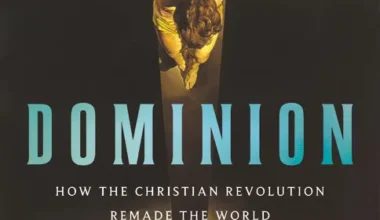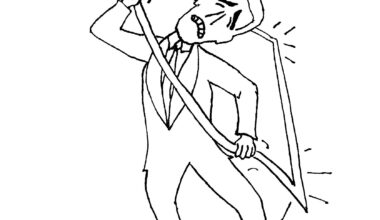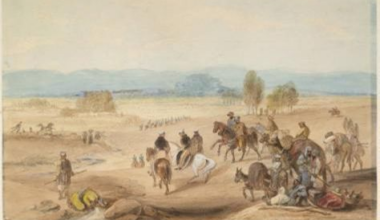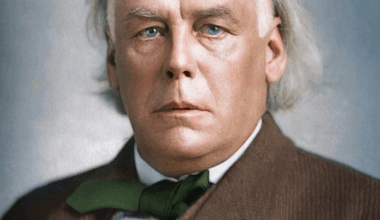‘Seven Shoulders is the most important book on American race relations that has ever been written.’ So declares the blurb of Seven Shoulders: Taxonomizing Racism in Modern America, a (more or less) self-published book by Canadian journalist Sam Forster. It’s certainly an extraordinary statement to make—one that demands an extraordinary book. What raises the stakes even more is the fact that the book’s central gimmick is that Forster, a white man, engaged in ‘journalistic blackface’, disguising himself as a black man for the sake of investigating racism in America today.
When Forster officially announced Seven Shoulders and its premise on Twitter/X, he was skewered on all sides. White people disguising themselves as black is passé and will provoke offence and indignation whatever the reason may be. Many black people, in particular, responded negatively because they felt that they were the best qualified to discuss the reality of being black. They also felt that they didn’t need a white Canadian man to don a synthetic afro wig, wear coloured contact lenses, and put on brown-coloured Maybelline foundation (specifically, mocha shade—because ‘I figured it was best not to get too ambitious’) to find out whether racism still exists in America.
Forster follows in the footsteps of other ‘journalistic blackface’ practitioners, on whose example he rests very heavily: he cites Ray Sprigle, John Howard Griffin, author of 1967’s Black Like Me (which he particularly admires), and Grace Halsell, author of 1969’s Soul Sister. All of them went incognito as ‘black’ to try to enlighten a largely ignorant and indifferent white America on the reality of the pervasive racism faced by black Americans, whether under the oppressive Jim Crow apartheid regime of the South in the 20th century or the unofficial but ubiquitous racism that black communities endured across Northern cities during the same period.
Even though journalistic blackface has already been done three times, Forster ‘felt [he] had no choice’ but to anoint himself as the heir to this tradition. Moreover, he proclaims that he is sui generis because he is ‘the first person to earnestly cross the color barrier in over half a century’—and he is especially unique because he is the first person to do so in a post-Rodney King, post-Barack Obama, and post-George Floyd America. This claim isn’t strictly true, as there have been reality TV shows from this century setting up social experiments where whites have been disguised as blacks and vice versa to see what life is like ‘on the other side’ of the racial divide.
Nevertheless, Forster doesn’t advertise Seven Shoulders as a moralistic screed. Instead, it’s a book that ‘prioritises methodical language and comprehensive analysis over emotional fervour and moral condemnation’ and he is the right person for this task because he is ‘inclined to describe rather than admonish.’
Unlike Ray Sprigle, who ‘ate, slept, traveled, lived Black’ (‘I lodged in Negro households. I ate in Negro restaurants. I slept in Negro hotels and lodging houses. I crept through the back and side doors of railroad stations’), Forster doesn’t embed himself within predominantly black communities. He doesn’t attempt to live a social life as a black man. No, the way Forster seeks to ‘taxonomize’ American racism (which, he says, can be divided into various categories, including two oft-conflated ones: ‘macro-level racial disparities’ and ‘institutional injustice’) is to pose as a hitchhiker on the sides, or shoulders, of seven different roads across the US, ‘first as a White man, and then again as a Black man on the following day.’
[I]t is rather shallow to make sweeping judgements on a topic as broad and intricate as race in America on the sole basis of a limited hitchhiking experiment.
He claims this hitchhiking experiment is an accurate way to ‘taxonomize’ contemporary racism in America because it ‘exposes real sentiments that might otherwise be concealed… It reveals how [Americans] act when nobody is telling them how to act.’ It reveals another category of racism: the ‘interpersonal’ type.
The problem with this is that this isn’t the America of the Beatniks, where hitchhiking culture was a lot more prominent than it is today. And it is rather shallow to make sweeping judgements on a topic as broad and intricate as race in America on the sole basis of a limited hitchhiking experiment—which is why the pompous statements peppered throughout the book are so jarring. For instance:
[N]obody has an experiential barometer with respect to race… nobody except for me… [You] may say that I haven’t lived enough Black life for my barometer to be useful. Say what you will. My barometer is better than anyone else’s.
Or:
I am a visionary writer who wants to demystify race in a way that is creative, compelling, and beautiful.
For all the vim and haughty rhetoric Forster deploys, Seven Shoulders is as underwhelming as it is superficial. This is disappointing in its own way, as I was slightly intrigued by the premise. Instead, I encountered a book that was confused and incoherently written. Publishing a chapter that actually contains the line ‘I don’t know what I’m supposed to say in this chapter’ doesn’t exactly instil confidence in you as a writer, ‘visionary’ or otherwise.
Though the journalistic blackface was unnecessary, not to mention silly, there might perhaps have been an interesting, if provocative, book investigating the textures and dynamics of race in America in the 21st century from a considered first-person view. Ray Sprigle and John Howard Griffin in their ethnographical studies at least spoke to black Americans and collected testimonies of their experiences of racism. The closest Forster comes to anything like this is a pedestrian interview with two unnamed black politicians (whom he interviewed as a white man) who were clearly unaware of what project their remarks were lent to.
Most of the commentary surrounding Seven Shoulders has focused on Forster’s use of blackface and thus the gravamen has been missed. He claims that in America today, instances of institutional racism are ‘extremely [he repeats this word over several pages in case you didn’t get it the first time—yes, really]…difficult to identify, and outward demonstrations of interpersonal racism are also a vanishing phenomenon.’
Whatever your opinion on whether Ray Sprigle, John Howard Griffin, and Grace Halsell were ever justified in engaging in journalistic blackface, one cannot deny that, in service of the cause of racial equality, they made sincere efforts to understand the reality of the racism that plagued their time.
This thesis very much rhymes with that of Dinesh D’Souza’s 1995 book The End of Racism and other arguments from American conservatives. In other words, Forster isn’t as original and avant-garde as his bumptious pronouncements would have us believe. Forster concedes that what he calls ‘shoulder racism’, based on what we might call unconscious bias, might occur in certain circumstances—but says that it is not a pressing social problem.
He also notes that he was perceived differently by the homeless when he was white compared to when he was black: he was constantly asked for money by homeless people (of whatever colour) as a white man, yet he wasn’t pestered by anyone for money as a black man, which I find believable. But that is the extent of the depth he arrives at when contemplating how whites and blacks may be perceived differently within society.
Whatever your opinion on whether Ray Sprigle, John Howard Griffin, and Grace Halsell were ever justified in engaging in journalistic blackface, one cannot deny that, in service of the cause of racial equality, they made sincere efforts to understand the reality of the racism that plagued their time. In contrast, Forster’s efforts in Seven Shoulders are an unserious and not even entertaining attempt at gonzo journalism. It feels like it was written in an unhinged frenzy, without any serious understanding of the complicated subject it broaches, and it makes bold claims and states tendentious conclusions based on a flimsy ‘experiment’ that a bad YouTuber could conduct.
As a black man—technically mixed race—I’m not even offended. I have thick skin and a broad back, so it takes a lot to make me cry. Besides, to be offended or hurt by Sam Forster’s gimmick I would have had to have taken it seriously. I do agree with Forster that most of the books currently written about race, whether by blacks or whites, are ‘tremendously boring.’ Alas, his is the latest addition to that pile.
Related reading
Race: the most difficult subject of all? Interview with Inaya Folarin Iman by Emma Park
Two types of ‘assimilation’: the US and China, by Grayson Slover
The Enlightenment and the making of modernity, by Piers Benn
Linnaeus, Buffon, and the battle for biology, by Charles Foster
‘The best way to combat bad speech is with good speech’ – interview with Maryam Namazie, by Emma Park
Young, radical and morally confused, by Gerfried Ambrosch
Can sentientism save the world? Interview with Jamie Woodhouse, by Emma Park
David Tennant, Kemi Badenoch, and the ugly sin of identity politics: a view from the right, by Frank Haviland









Your email address will not be published. Comments are subject to our Community Guidelines. Required fields are marked *
Donate